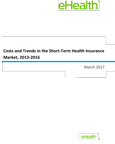MOUNTAIN VIEW, Calif.--(BUSINESS WIRE)--Today eHealth, Inc. (NASDAQ: EHTH), which operates eHealth.com, the nation’s first and largest private online health insurance exchange, published a report on costs and trends in the short-term health insurance market identifying average premiums and deductibles.
The report includes results from a survey of short-term health insurance policy holders exploring their feelings about and reasons for purchasing short-term coverage.
“Short-term health insurance is not a substitute for major medical health insurance, but many of our customers will feel the pressure to consider alternatives like short-term insurance until Congress and the Trump Administration are able to take action to make individual and family health insurance more affordable,” said eHealth CEO Scott Flanders. “In the interim, short-term products continue to serve as an important stop-gap option for people who failed to enroll during Obamacare’s open enrollment period or who are currently being priced out of the market for traditional major medical coverage.”
Mr. Flanders continued, “If implemented, I believe the GOP replacement plan that was introduced on Monday will be very effective at stabilizing the individual health insurance market, bringing in young and healthy people, and lowering overall costs.”
The full report, Costs and Trends in the Short-Term Health Insurance Market, 2013-2016 is available in the company’s media center. Highlights of the report include the following:
- 121,000+ short-term application were submitted at eHealth in 2016: This is almost twice the number of short-term applications submitted in 2013, the year before major provisions of the Obamacare law took effect
- Monthly short-term premiums decreased in 2016: The average monthly premium for short-term plans decreased 5% for individuals (from $116 to $110) and 2% for families (from $283 to $276) between 2015 and 2016
- 57% of short-term customers were young adults: More than half (57%) of short-term applicants were between the ages of 18 and 34
- Affordability makes short-term coverage appealing: Seven-in-ten survey respondents (70%) said they liked the affordable monthly premium costs of their short-term plan
- 65% reviewed their eligibility for premium tax credits: A majority of survey respondents said they had looked into whether they would qualify for government subsidies to purchase major medical coverage before choosing short-term coverage instead
Short-term health insurance plans offer temporary, limited coverage compared to major medical health insurance plans. In addition to providing coverage only for limited periods of time, short-term products do not meet the coverage requirements of the Affordable Care Act (the law known as Obamacare) and may leave enrollees open to federal tax penalties. Short-term plans typically do not provide coverage for preventive care or pre-existing medical conditions. Also unlike major medical plans, it is possible to be declined for a short-term plan based on an applicant’s personal medical history.
Despite these considerations, many health insurance shoppers turn to short-term health insurance plans to reduce their risk when not covered by a major medical plan, or because short-term plans typically have lower monthly premiums than major medical plans.
The findings presented in eHealth’s Costs and Trends in the Short-Term Health Insurance Market report are based solely on short-term health insurance plans selected by eHealth customers during the 2013-2016 calendar years, and on a voluntary survey of consumers who purchased short-term coverage through eHealth. For more information, refer to the Methodology section at the end of the report.
eHealth
eHealth, Inc. (NASDAQ: EHTH) owns eHealth.com, the nation's first and largest private online health insurance exchange where individuals, families and small businesses can compare health insurance products from leading insurers side by side and purchase and enroll in coverage online. eHealth offers thousands of individual, family and small business health plans underwritten by many of the nation's leading health insurance companies. eHealth (through its subsidiaries) is licensed to sell health insurance in all 50 states and the District of Columbia. eHealth also offers educational resources and powerful online and pharmacy-based tools to help Medicare beneficiaries navigate Medicare health insurance options, choose the right plan and enroll in select plans online through Medicare.com (www.Medicare.com), eHealthMedicare.com (www.eHealthMedicare.com) and PlanPrescriber.com (www.PlanPrescriber.com).
For more health insurance news and information, visit eHealth's Consumer Resource Center.





